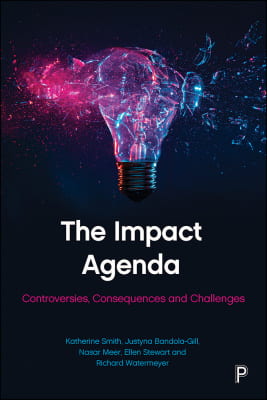
The UK’s current approach to measuring and rewarding research impact is flawed in multiple ways, and we make the case in the book for an alternative approach that focuses on engagement rather than impact. This blog situates the findings in the context of the current COVID-19 pandemic.The book begins by tracking the origins and aims of the UK’s approach to monitoring and incentivising research impact, noting the growing international interest in these developments. It summarises the raft of concerns that have been put forward by others and then draws on interview and focus group data to examine how impact-related changes that have been introduced in the UK are shaping academics’ lives and work, before turning to the views of those assessing research impact for REF. We end by outlining our recommendations for a new kind of impact agenda.
One of the most consistent critiques that social scientists have made of the UK’s impact agenda (see, for example, here and here) is that external events, over which academics have no control, massively increase/decrease the relevance (and therefore potential impact) of research. Virologists who have studied coronaviruses, epidemiological and mathematical modellers and historical analysts of previous pandemics have all recently been in the media spotlight. At the same time, there are plenty of researchers examining issues not currently in the spotlight but which may one day seem crucial, as new challenges and crises emerge.
Simply put, we have expertise in universities to help us deal with new viruses partly because these researchers were able to do some of that work in pre-COVID-19 times. So, paradoxically, the current situation shows us just how crucial it is for universities to protect spaces for research without apparent immediate benefit.
This does not mean there cannot, or should not, be any effort to encourage academics to engage beyond their ‘ivory towers’. Indeed, many of our research participants noted positive consequences of the UK’s recent concern with research impact. We heard, for example, widespread enthusiasm for research being well communicated to a range of audiences, stories of researchers across a wide range of disciplines engaging with potential users and publics, and reflections that the impact agenda did seem to have encouraged universities to better support researchers in quickly responding to current events and crises.
Yet, our participants also raised multiple concerns with the UK’s approach to research impact and it was clear that some participants were concerned about impact becoming an end in itself. Some of these concerns corroborated those in the existing literature, others were new. One fairly consistent message was that, especially as we can’t know in advance what future challenges will be, or which new discoveries will help, we need to ensure we protect exploratory research and research that is out of kilter with current policy trajectories. It was notable that our interviewees differentiated their own experiences of ‘real impact’ (research developed organically, often over long periods, which they felt had achieved meaningful impact – sometimes unexpected, often collaborative) and the artificial stories of ‘REF impact’ constructed to meet evaluation criteria.
Building on these debates, we end the book with the following eight recommendations:
- Reward impactful environments (not individual achievements);
- Value a wider range of activities (including public engagement);
- Protect spaces and funding for critical and discovery work (without obvious impacts);
- Reject simplistic notions of ‘excellence’ which denigrate the local;
- Weaken the link between original research and impact to encourage knowledge synthesis and collaboration;
- Consider the ethics of impact;
- Defend and promote academic rigour and autonomy;
- Create spaces in which valiant failures are celebrated and learned from.
This will be of interest not only to higher education policy makers and academics working in the UK, but also to those working further afield who are considering importing or adapting the UK’s approach. Higher education is beginning to chart a route through and beyond this exceptional moment. Learning from the past, and reimagining the future relationship between research and policy, is more important than ever.
